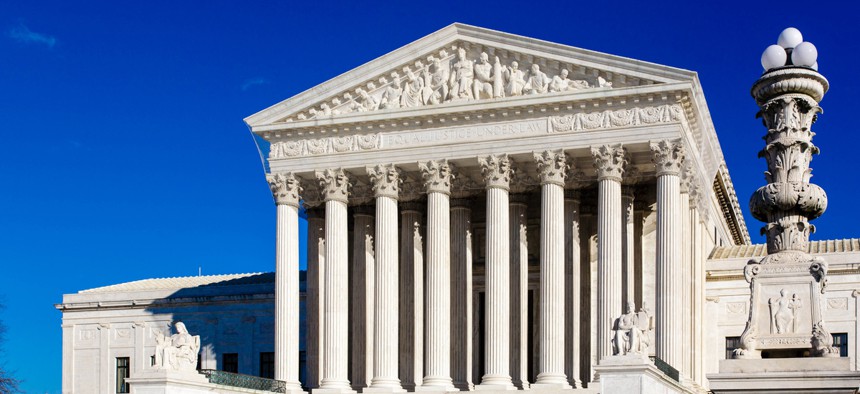Supreme Court to Hear Energy Companies’ Appeal in City Climate Change Lawsuit

The Supreme Court will decide whether Baltimore's lawsuit over climate change liability should be heard in federal or state court. Shutterstock
The suit brought by Baltimore is part of a national trend of cities, counties, and state governments suing oil and gas companies over the impact of climate change.
The U.S. Supreme Court will hear a case that pits some of the country’s largest oil companies against a local government seeking financial compensation for the impact of climate change.
On Friday, the high court agreed to hear the appeal from energy companies, including Exxon Mobil, BP, Chevron, and Shell, in a lawsuit brought by the Baltimore city government. The court will decide whether the lawsuit should be heard in state court, as Baltimore requested, or in federal court, which companies often see as more favorable to them.
Baltimore’s lawsuit was first filed in 2018. At the time, city officials said that energy companies have known for decades that their practices contribute to climate change. The suit states that "as a direct and proximate consequence of defendants' wrongful conduct ... flooding and storms will become more frequent and more severe, and average sea level will rise substantially along Maryland's coast, including in Baltimore.”
At a 2018 news conference, former City Solicitor Andre M. Davis said the city would be paying for the costs associated with climate change for generations to come. "Baltimore's residents, workers and businesses shouldn't have to pay for the damage knowingly caused by these companies,” he said.
Baltimore is not the first local government to sue a company over their contribution to climate change. In the past few years, more than a dozen states, cities, and counties have filed lawsuits against companies that extract and distribute fossil fuels, arguing that their operations produce the greenhouse gases that are to blame for rising sea levels, more frequent and devastating natural disasters, and hotter temperatures.
The governments often argue that fossil fuel companies should be financially responsible for things like roads that have to be replaced due to flooding, land that must be treated after wildfires or erosion, and the installation of preventative infrastructure and risk management measures. The legal strategy in these cases is similar to how states pursued litigation against tobacco companies in the 1990s, when they argued that the companies were liable for the strain on public health systems for diseases related to cigarette smoking.
In response to cases brought by Baltimore and other local governments, energy companies have argued that courts are the wrong venue to deal with climate change, which they say should be dealt with by public policy changes rather than liability rulings.
The outcome of Baltimore’s case could have an impact on other lawsuits that have been stalled for years as the parties spar over which venue is appropriate—federal or state court.
In the Baltimore case, a federal judge and a 4th U.S. Circuit Court of Appeals panel both ruled state court was the proper jurisdiction.
A federal district court judge in 2018 dismissed lawsuits brought by San Francisco and Oakland, saying courts weren’t the right place to fix global warming. But this year that case was revived by a three-judge panel on the 9th U.S. Circuit Court of Appeals, which also found that a different lawsuit brought by a group of California counties should be heard by a state court. The 10th U.S. Circuit Court of Appeals made the same determination this year in a case brought by cities and counties in Colorado.
This will be the second time the U.S. Supreme Court considers aspects of the Baltimore case. In 2019, the high court rejected a request by the energy companies to put the case on hold following a federal judge’s decision to remand the case back to the state level. The companies wanted to freeze state court proceedings while they appealed the federal court ruling.
Chevron spokesperson Sean Comey said in a statement that he was pleased to see the high court take up the issue again and hopes to see a ruling in favor of hearing these cases in federal court.
“These cases have sweeping implications for national energy policy, national security, foreign policy, and other uniquely federal interests,” Comey said. “They belong in federal court and we are hopeful the Supreme Court will agree that these issues require a closer look.”
Dana P. Moore, Baltimore’s acting solicitor, noted in a statement that the Supreme Court will only rule on court jurisdiction, but would not evaluate the broader issue of whether the energy companies are liable for damages caused by climate change. Still, she lamented the delay. “It has been over two years since the city of Baltimore filed our case,” she said. “Two more years of increased climate change damage to our city, and two more years of mounting costs to our taxpayers.”
Emma Coleman is the assistant editor for Route Fifty.
NEXT STORY: Could a Few State Legislatures Choose the Next President?






